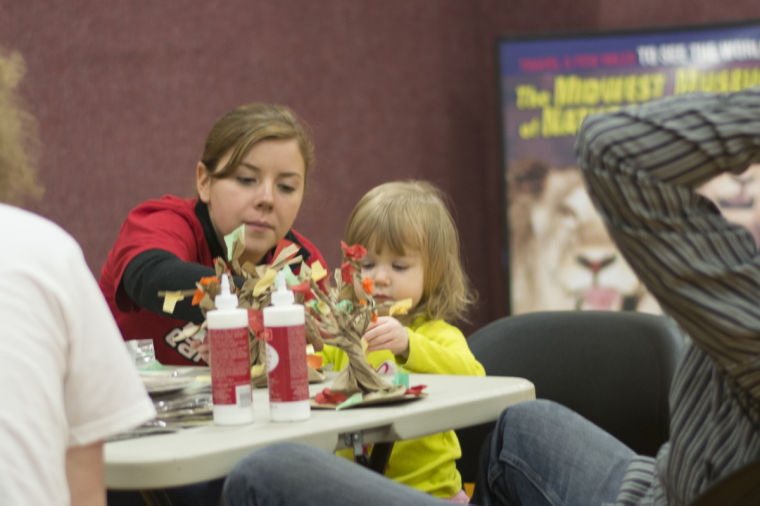City offers resources for Earth Week
Kathryn Olson, senior environmental studies major, shows two-year-old Eleanor Burlingame how to make paper-bag trees on Saturday at the Green Family fun day in Haish Gym.
April 21, 2013
Earth Day is April 22, and there are many ways people can keep the environment in mind.
Melissa Burlingame, program coordinator for NIU’s Institute for the Study of the Environment, Sustainability and Energy, said saving energy is one of the easiest ways to be green, and “phantom-powered” devices should be avoided. These devices are ones with a light that is on even when the device is not, like microwaves with a clock, a lamp on a timer or a computer monitor. Burlingame recommends using power strips in order to make it easy to turn off these devices nightly.
“By being green, you’re saving green,” she said. “In many instances, don’t buy the newest, greatest fashions. Go check out the thrift stores. Thrift stores are a great way of reusing.”
Burlingame said recycling is a good way to reuse, and this can easily be done by buying a reusable plastic water bottle instead of purchasing bottled water.
People can also bring their recyclables to a local recycling center.
Mark Hein, vice president of DeKalb Iron and Metal Co. (DIMCO), said the recycling center at 900 Oak St. is offering special prices on aluminum cans this week. Today through Saturday, DIMCO will buy aluminum cans for 70 cents per pound instead of the usual 56 cents. Hein said he started this special about four years ago.
“It’s a good way to get a little extra money, because we’re paying a premium price,” Hein said. “Recycling is also a good thing, which in the long run saves energy.”
Hein hopes this week’s special prices will encourage people to recycle more.
“People drive through our recycling center and they see other things they can recycle and get paid for,” Hein said. “Hopefully people will realize we don’t just buy aluminum cans. There’s a lot of other things we buy and pay for.”
DIMCO also buys brass, copper, stainless steel and lead. Prices vary based on the type of metal.
Hein said another way people can recycle is by using bags from the grocery store that can be returned to the store and reused.
Hein said people can even be environmentally friendly when they are traveling.
“I think people are doing this more and more now, combining trips,” Hein said. “If you’re going to get in the car and go somewhere, make two or three stops rather than just making one stop and going back home.”
Burlingame agrees that a lot of energy can be saved when traveling.
“If you are commuting, carpooling would be a good option,” Burlingame said. “If you live in an apartment off campus, don’t drive. Take the bus.”
She said humans can also change their personal habits to be more environmentally friendly.
“One thing that gets overlooked, because it might get kind of political, is to eat less meat,” she said. “There’s a lot of fossil fuel resources that go into transporting our meat, so students should eat more of a vegetable-based diet. It will be using less fossil fuel resources. In order to feed the animals, you have to transport the grains and the animals are not raised in the same place the food was raised, so it makes a big impact.”
Rodrigo Narbona, philosophy graduate student and president of the Vegetarian Education Group, agrees with Burlingame and believes in the benefits of vegetarianism.
“In order to feed the animals we eat, we have to go a longer distance and we’re basically throwing away food,” Narbona said. “The 10 leading causes of death in this country are all related to how we eat. Taking care of that aspect is an easy way to prevent these.”
Burlingame thinks people should be concerned for the environment because it affects everything people do, and the current environmental problem is related to a shift in culture.
“We are [have] a mindset of consumerism and not of conserving,” she said. “I think we need to be able to change the way that our larger society thinks in buying, using and throwing things away. We need to do what our grandparents and our great-grandparents were doing, which was buying something really good quality and using it for a really long time. Get stuff fixed, don’t use it then throw it away for the next new gadget. It might be good for the economy in the short term, but in the long term, it’s really going to hurt our environment.”



